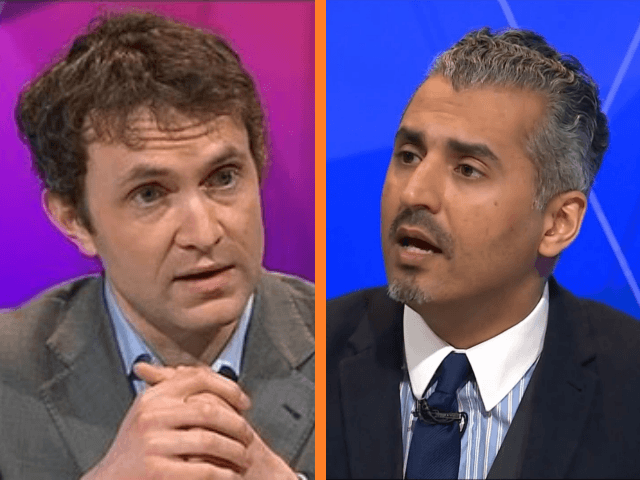The BBC was forced to issue two apologies after the chairman of the Iranian-linked Islamic Human Rights Commission (IHRC) called reformist Muslim Maajid Nawaz and political commentator Douglas Murray “hate preachers” in an interview.
The IHRC’s Massoud Shadjareh was interviewed by BBC News following the Finsbury Park Mosque terror attack in which worshippers leaving a mosque were mown down by a man driving a truck. The suspect is a 47-year-old identified as Darren Osborne.
Blaming the attack on Mr. Murray, right-wing journalist Katie Hopkins, and Mr. Nawaz, the leader of the hardline Islamist group labelled them “hate preachers” on the programme on Monday.
Shadjareh’s Khomeinist organisation’s position on the Hezbollah-Israel war of 2006, where the IHRC said British Muslims could provide the Lebanese Shia terror organisation with “financial, logistical and informational support” to attack Israeli installations, did not appear to be taken into account by the BBC when it vetted its interviewees.
On BBC News on Tuesday, the broadcaster apologised to Mr. Nawaz for airing the comments.
Yesterday, pro-Iran, pro-Hizbollah, Shia-Islamist head of @IHRC Masoud Shadjareh called me a 'hate preacher' on TV. @BBCNews just apologised pic.twitter.com/CK7b87kiei
— Maajid – (Mājid) [maːʤɪd] ماجد (@MaajidNawaz) June 20, 2017
The newsreader said: “At this time yesterday, we interviewed live a contributor, who expressed the view that Maajid Nawaz was a ‘hate preacher’… We would like to make clear that we were unaware that Mr. Nawaz would be named in this way, and would like to apologise to Mr. Nawaz.”
Mr. Nawaz, founder of anti-extremist think tank the Quilliam Foundation, tweeted on Monday: “The allegation came as revenge, one day after I publicly criticised [the] organiser of [a] rally who told his followers to fly jihadist flags in London.”
Shadjareh organised the anti-Semitic, anti-Israel al-Quds Day march in London last weekend, where many Hezbollah terror flags were flown. The IHRC claims Hezbollah flags flown during al-Quds Day represent the political wing of the Lebanese Shia terror organisation, as the military wing is proscribed in the United Kingdom – a distinction Hezbollah itself does not make.
Police have now launched a probe into the al-Quds Day march over possible hate crimes and the display of Hezbollah flags, reports The Jewish Chronicle.
On Thursday, the BBC issued its second on-air apology, this time to Mr. Murray, the associate director of the Henry Jackson Society think tank which works to counter extremism and support liberal democracy.
On Monday, @IHRC's Masoud Shadjareh falsely called @DouglasKMurray a 'hate preacher' on @BBCNews – the BBC have just apologised pic.twitter.com/SPvseFYFKR
— Henry Jackson Society (@HJS_Org) June 22, 2017
The newsreader said: “At this time on Monday, we interviewed live a contributor who expressed the view that Douglas Murray was a ‘hate preacher’… We’d like to make it clear that we were unaware Mr. Murray would be named in this way and would like to apologise to him.”
Neither apologies prepared by the BBC named the prominent Islamist “contributor” nor the provenance of his organisation.
Haras Rafiq, chief executive of the Quilliam Foundation, criticised the BBC, tweeting: “Second apology in 2 days – BBC really needs to be more careful with their guests.”
Second apology in 2 days – BBC really needs to be more careful with their guests https://t.co/OMUMFXKgOj
— Haras Rafiq (@HarasRafiq) June 22, 2017
Ouch, first me then @DouglasKMurray. The BBC ain't gonna like having pro-Hizbollah Masoud Shadjareh of the IHRC on much anymore https://t.co/93nrYwOsFB
— Maajid – (Mājid) [maːʤɪd] ماجد (@MaajidNawaz) June 22, 2017
This is also the second occasion the BBC has had to recover from its reporting surrounding the attack at the Finsbury Park Mosque.
Breitbart London reported the broadcaster published a story entitled: “What is Islamophobia?”, meant for children, hours after the attack which contained misleading information such as the common trope that “Islam means peace”, whereas it actually means “submission”.
Following the publication of the article, penned by Editor in Chief Raheem Kassam, the wording on the BBC’s website was changed to: “The word ‘Islam’ means submission to God’s will and obedience to God’s law.”
Following my rumbling of the BBC's fake "Islam means peace" news, they've amended their copy… https://t.co/vh7qEvbmth pic.twitter.com/tz26tG8bJd
— Raheem Kassam (@RaheemKassam) June 21, 2017

COMMENTS
Please let us know if you're having issues with commenting.